Living with intention: unlock your full potential with Ian Brooks
In this episode of our productivity podcast, Get More Done, we show you how to be more focused and enjoy a fulfilling life. Being more productive is the key to transforming your life by building solid foundations to shore up your ambitions
The YouCanBookMe team
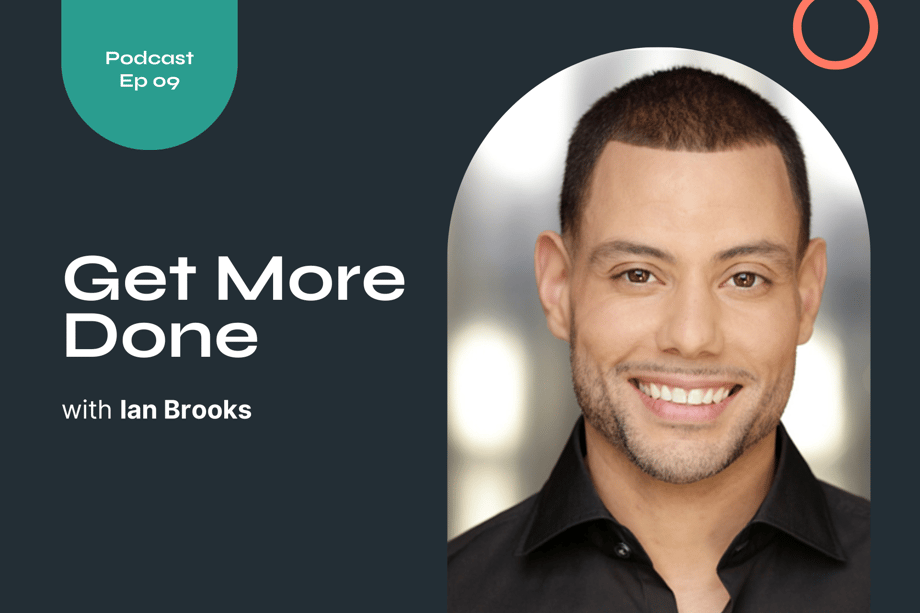
Do you feel you’re always busy, but not finishing your to-do list? Do you have ambitions but feel you’re on shaky ground when you try to achieve them? Do you want to know how to get more done, find your purpose and build solid foundations to hold you as you reach up for your goals?
In this podcast, coach and psychologist Ian Brooks shares his experiences of working with the biggest companies in the world - and reveals what they all had in common which was blocking them from fulfilling their potential. Now you can tap into his research to avoid making the same mistakes.
You can find Get More Done on:
Listen to episode 9:
In the episode, “Living With Intention: How To Unlock Your Full Potential,” we discuss:
- Discover the steps you can take to be more focused and live a fulfilling life
- Be more productive - personally and professionally - to get the max out of life
- See where other people stumble when seeking to transform their lives - so you won't make the same mistakes
- Be able to build the behaviors into the fabric of who you were and who you are
- Realize that you can transform by following coach and psychologist Ian Brooks' wisdom
- Manage your Pace with:
- Patience
- Accountability
- Commitment
- Emotions
- Create as much efficiency, productivity and visibility as possible
- Understand the importance of investing in yourself, your health, your body, your mind
Favorite Quotes
“We're not all starting from the same start. We all have a different place. We have different choices. We have our own different fabric, but yet as we think about transformation and some of its difficulties, one of the challenges is that we're driven by social media and visibility. We're judging ourselves against other people and other things. We're judging ourselves against an end result that we are prescribed to.” - Ian Brooks
“One of the things that I do with my clients is from the very outset, I ask them to really step back and say I want them to manage their pace. And pace for me is an acronym for number one, the P stands for patience. We need to be patient on this journey. ” - Ian Brooks
“Our accountability is extremely important because no one's gonna ask us: “Did we do or not do, right?” It's just up to us. So holding ourselves accountable and saying, “Is this important enough for me? Is this something that I truly want to achieve?” And this gets us back to, “What am I willing to do in that capacity?” - Ian Brooks
“It is without fail when we're doing something different, we're creating and exposing ourselves to a level of vulnerability that we may not necessarily be ready for. We have to be able to manage our emotions, the highs and the lows around the process. So as we're going through the transformation, managing our pace from the very outset and being conscious of it as we move forward, this becomes an extremely important tactic and something we need to be reminded of early on.” - Ian Brooks
Meet today’s guest, Ian Brooks
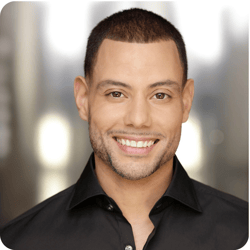
Ian is the CEO and founder of Rhodes Smith Consulting - a Personal and Professional Development firm specializing In behavioral transformations - and the Author of Intention: Building Capabilities to Transform Your Story.
For over 24 years he has worked in a clinical ward and is now helping people and organizations build skills toward achieving new heights.
Clients have included Netflix, Shondaland, Bank of America, Guitar Center, Nike Inc. Sony, and Warner Brothers.
Ian has a passion for working with individuals seeking expansion and leaders within organizations to develop key skills toward navigating their organization and working with their teams.
Productivity resources to explore
-
Intention: Building Capabilities to Transform Your Story by Ian Brooks
“Living With Intention: How To Unlock Your Full Potential” full transcript
This transcript has been slightly edited for clarity and readability.
Ben (00:00):
Hey there, you're listening to Get More Done. I'm your host Ben Dlugiewicz. Each episode, we'll talk with folks from different industries to learn how they're doing more with less. They will help you level up to build systems to scale, leverage automation and everything in between. In this episode, I sat down with Ian Brooks, a consultant, coach, and psychologist who helps individuals and corporations transform to unlock their full potential. In his recent book Intention: Building Capabilities to Transform Your Story. He lays out the steps everyone can take to live a more focused and fulfilling life built on a foundation of intention. Enjoy.
Ben (00:50):
Excellent. Welcome back to Get More Done. The podcast is all about productivity. In today's episode, I'm joined with Ian Brooks, the CEO and founder of Rhodes Smith Consulting. So Ian, welcome to the podcast.
Ian (01:02):
No, thanks for having me, Ben. Glad to be here.
Ben (01:04):
Excellent. So typically when we start these, just to break up the nerves a little bit, we'll do an icebreaker question to get you out of the process of just repeating answers. So this one, because you've spent so much time in the psychology field and are an expert, if you could instantly be an expert in any other subject, what would it be and why?
Ian (01:26):
Yeah, for me, that's fairly easy because it aligns to one of my other passions and that would be a sommelier or an expert in wine tasting. I love drinking wine. I love making drinks, period. In a former life, I was a bartender and I tend to make drinks on my own and just try to experiment. I love the nuance of what wine brings and there's so much variation based on the soil, the ingredients, the region, the barrels, and the aging process that it offers complexity in,one, how to make it and, secondly, just the flavor profiles and so forth that really bring about so much character and a story if you will. So it would blend, one, my interest in drinking wine and just drinking in general but, secondly, also the passion of understanding the background behind that too. So if I was expert in anything, it'd be wine making and being a sommelier.
Ben (02:27):
Awesome. Yeah. I don't think I have the palate for that. I couldn't tell you a good wine versus a bad wine. And most people, if you charge them more money, they're like "this wine's delicious," right?
Ian (02:36):
Yes. Absolutely.
Ben (02:39):
Awesome. So tell us a little bit about your book that you just wrapped up here, Intention. I'd love to know a little bit more on why you decided to write this book and most importantly, what do you hope the readers get from Intention?
Ian (02:56):
It's a great question. And for the listeners, just for background, I did write a book called Intention: Building Capabilities to Transform Your Story. Intention really was born out of my work working with individuals as a personal and professional coach. I see the experience that individuals go through as they're looking to transform their lives, be that at work building a capability or a new skill set or an individual just looking to expand. As I was going through that process and that journey, just working with a number of different clients, I recognized that they were stumbling in the same places. It tended to be that while they had a wonderful plan, they weren't able to necessarily invoke or actually execute against their actions on a more consistent basis. And if they were consistent, they couldn't necessarily sustain it because they hadn't built the behaviors into the fabric of who they were and who they are.
Ian (03:52):
So as I thought about those two challenges of, one, consistency and, secondly, sustainability, I then went back and said: "Okay, where does that come from?". And from answering that question of “where does that come from?, where does that challenge come from?”, I then went back and said: "Okay, first, are we solving for the right challenges? And then secondly, where are we integrating this into our lives?." And really more specifically, integrating that into, “who am I as a person?”. Not looking at the end result as a linear process, but one building into the fabric of my identity of who I am, my decisions, my choices, so that I can now build it into the fabric of my day to days, then changing my routines and patterns. So as such, I wrote Intention first just by documenting the instances where people are challenged and, more specifically, offering a guide.
Ian (04:44):
So to the second part of your question of what is Intention really about? Intention really does provide an offering of clarity. Steps to transform one's story because we're actually talking about behaviors and capabilities. By reinforcing the new capabilities so we can move forward because capabilities are transferable to many situations. Oftentimes when we think about transformations, we think about it in a very myopic, singular process-oriented or change-specific way. I'm really taking this out and driving towards behaviors that are transferable to other situations. Now, the book is written in a story-based format where I'm combining fiction, non-fiction and research with my own personal experience and those of whom I've coached to truly illuminate a path forward for people to now embark upon their own journey. The book is written into five different parts.
Ian (05:43):
The first is, as I mentioned, around discovery. The second piece is around the principle of you. Those two first parts are where we typically see the struggles, or at least in my experience, of where people are really establishing the foundation of who they are and what they want. That leads them to the third piece of building a plan. Now that's really establishing hardcore thinking and really asking questions to get people to really break out of their shells and expand past their current patterns. The last sections are really based off the experience. Actually taking very specific steps on creating new experiences on a week-to-week, moment-to-moment basis. At the end of the week that leads us to the fifth part of attunement - that part of reflection. So we can actually go back and think about what we've done, the decisions we've made and take stock in the progress that we have made. Now, each of these parts are offered in a series of questions that really are intended to elicit different questions and thoughts and really drive readers to solve a very specific problem while also acknowledging that we're building bond capabilities that are transferable across other ways.
Ben (06:50):
Yeah, absolutely. And I mean, that makes total sense of not just having it be an endpoint, but making it part of the fabric of who you are. In order to have that sustainable transformation, it has to be something from within and something that's a part of you now. I am this new thing. Makes total sense. Yeah. And speak a little bit more about these types of transformations. Cause I've heard you say that they can take a lot of time. It's not necessarily like a light switch, right? It can take a bit of time to formulate these new patterns. Is it possible for everyone to be able to shift, become more productive, and to transform more than other people?
Ian (07:29):
Yeah, it really is. More specifically, it's that we all can transform. As I described in the book, we are all built on the basis that we are evolving whether we want to or not. We get old, we get gray hair, we will die at some point. When we stub our toe, we start hopping. We do go through our own evolution. I'm actually bringing that to the forefront of consciousness. When we're making a choice with transformation, we're now gonna be intentional about that. That means we're creating some level of detail and a level of specificity that is necessary for us to do something different. Now transformations do take time. Recognizing that we just didn't get here today. Oftentimes, I'm working with my clients, the first thing I acknowledge with them is that I can't judge the book based on the chapter I'm walking in on. Thus, when I'm actually working with somebody or even acknowledging a pain point for myself, I'm recognizing that's an accumulation of different choices, different actions that kept me safe and potentially made me successful to the point where I'm at today.
Ian (08:41):
But where I want to be tomorrow will take a different fabric, a different level of thinking, a different level of writing. A new story of new behaviors that requires a certain level of consciousness. And as such, one of the biggest things that we are all trying to do is be better and be better from a transformative standpoint. And more specifically, you'll hear me repeat it again, is around the consciousness of doing something different of which we all can do. Now, I will say that we are all starting from a different point.
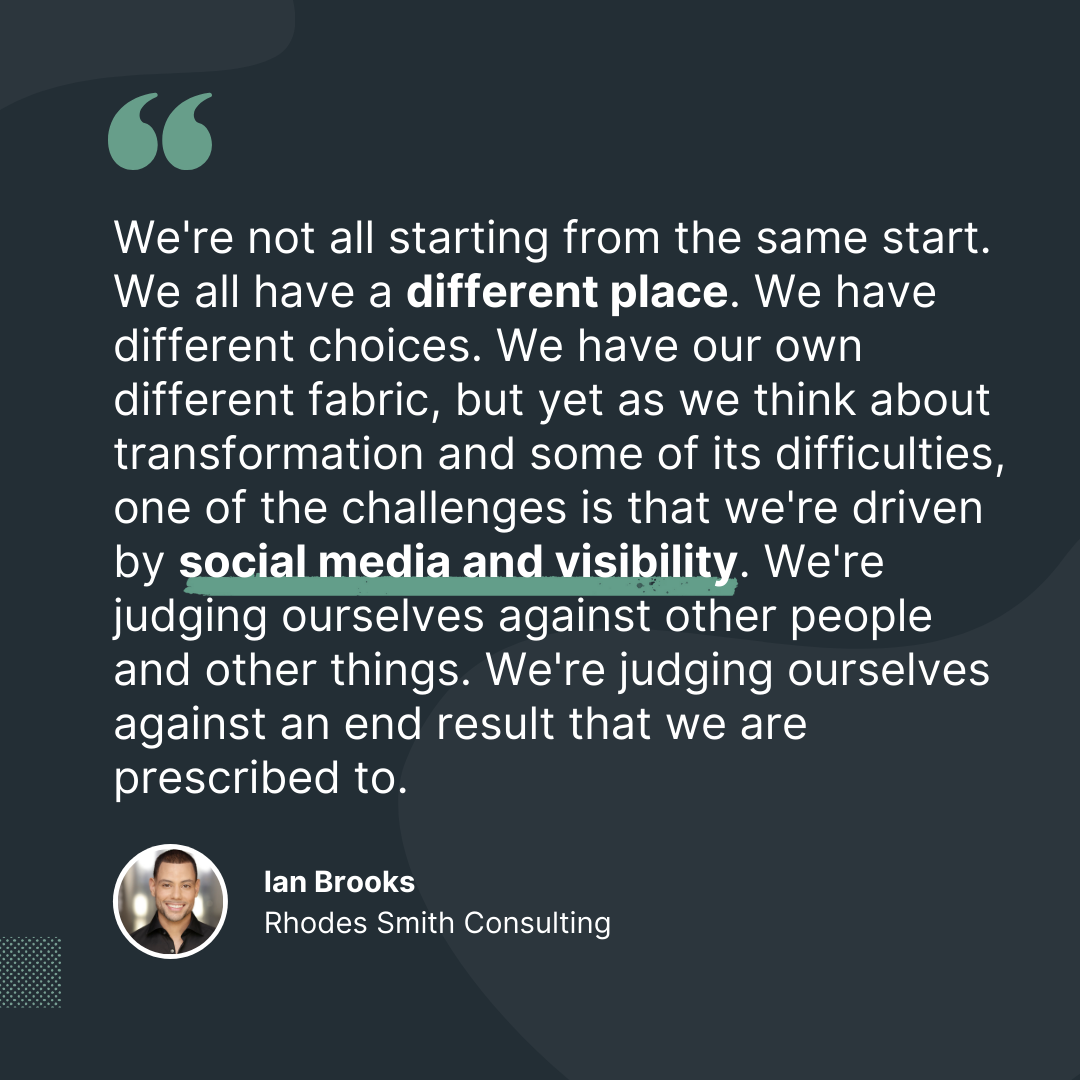
Ian (09:35):
More succinctly, answering your question, transformations do take time because you just didn't get here today. We are going to have to unravel some of these complexities of the decisions and choices, and even the environment of the people, places, and things that surround us and keep us safe. As such we are all starting and have the capability to transform, but we're all starting from a different place in order to do so. We have to make sure that it's conscious so that we can move forward on a consistent basis. So we can again, build it into the fabric of who we are so we can sustain whatever new behaviors and expectations that we have for ourself moving forward.
Ben (10:16):
Yeah. I love that because it's open to everybody. It's not just this unattainable thing because it starts with your own mind and your own consciousness of focusing on what you want and chiseling that out. So with all of the folks, the students, the clients, and the coaches, all the coaching that you've done in adapting these transformations, what have been some struggles for folks?
Ian (10:41):
Yeah. It's hard. It's something that we all go through. And I say we because I go through it myself as well. Sometimes we just rush for an end result, right? We are rushing just to get to an end point. Because we're looking for that new job title. We're looking to score that next gig. We're looking to have the play or the movie that we just wrote hit the big screen. We're already looking for that end result. And oftentimes, it's hard to control that because if you actually describe transformation or change to someone, many are looking for what's that return on my investment alla my dollars or my time. What's that tangible accent that I'm out now being judged for myself and others are judging me as well.
Ian (11:35):
Sometimes that's hard to control and we're just rushing to get to those end points. And so one of the things that I do with my clients is from the very outset, I ask them to really step back and say I want them to manage their pace. And pace for me is an acronym for number one, the P stands for patience. We need to be patient on this journey. As I mentioned earlier, people wanna rush to get to that end result. And we just didn't get here today. We're gonna be uncovering and discovering new parts about ourselves and new parts about our environment that keep us where we are. So we have to be patient on that journey of change and more specifically the transformation, because we're gonna be unraveling and letting go of certain things while also starting new behaviors, which requires some level of consciousness. That second part around pace is the A for accountability.
Ian (12:31):
Our accountability is extremely important because no one's gonna ask us: “Did we do or not do, right?” It's just up to us. So holding ourselves accountable and saying, “is this important enough for me? Is this something that I truly want to achieve?” And this gets us back to, “what am I willing to do in that capacity?”. When I'm talking to my clients, I can only take them so far around a conversation. Around the awareness. Around the discovery, but it's up to them to go do. I can't do that for them. So they have to hold themselves accountable. The C around that is for commitment. So we have patience, accountability, and their continuous commitment. Being committed is about making sure we're maintaining our consciousness around what we're doing and why we're doing it. The E is around our emotions with any change and any transformation.
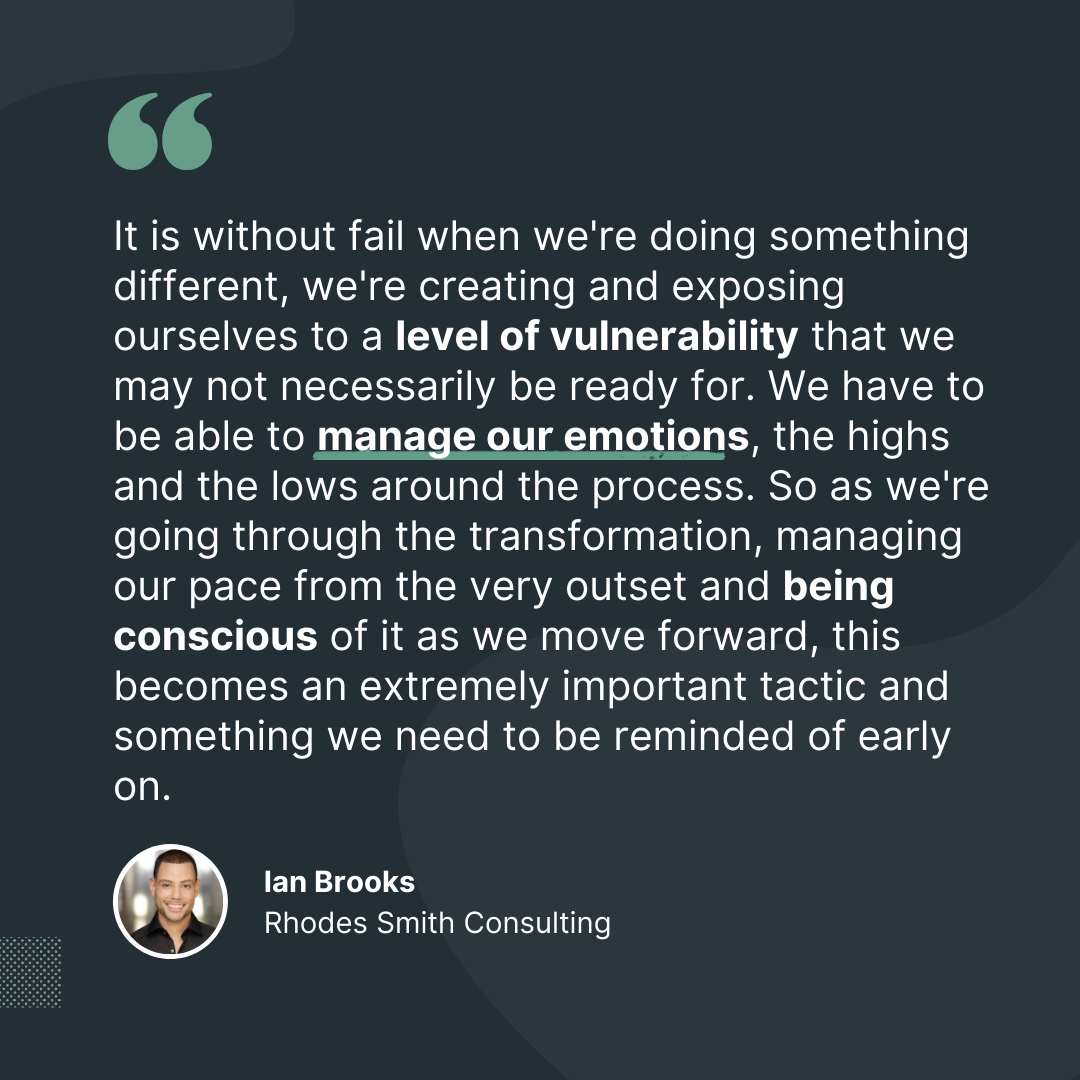
Ian (13:25):
It is without fail when we're doing something different, we're creating and exposing ourselves to a level of vulnerability that we may not necessarily be ready for. We have to be able to manage our emotions, the highs and the lows around the process. So as we're going through the transformation, managing our pace from the very outset and being conscious of it as we move forward, this becomes an extremely important tactic and something we need to be reminded of early on.” And I know my clients aren't necessarily struggling with that early on, but I'm constantly reminding them and even myself as I go through that transformative process.
Ben (14:02):
Yeah. I guess that's the telling part of just not trying to rush the results, because these are life-changing transformations we're talking about. Not just, "Oh, I'm gonna wake up one day and be a new person." That's not how this whole thing works. So, everybody listening, pace yourselves, be patient. And I love how you're talking about that vulnerability because tying into your emotions is how these changes are gonna come about. Now stepping away from the personal transformations, in your past you've worked with corporations and their change management. So how do you see that differently or maybe being a bit different in a corporation or a company doing some transformations?
Ian (14:45):
With the corporations I'm working with, I've worked with them on a number of different levels, both from a leadership development perspective, but also helping them from a more transformative, systematic, or technology-driven change at the individual level. From a coaching perspective, it's a very similar experience of coaching those individuals, as well as the individuals who are outside of my corporate space from a professional standpoint. Their consistency is around being better. Now where their better is being applied is a little bit different, right? From a leadership standpoint, I'm really focused on specific behaviors, on how they're impacting their teams or their peers or how they're managing up. So as an example, I'm working with a client now around specific details surrounding managing former peers, so that really takes the shape of communication and leading up.
Ian (15:37):
Also, how are they showing up within meetings as a natural introvert? This particular individual isn't necessarily geared towards speaking up in meetings or representing their own team or allowing others to speak on their behalf. So I'm working with that individual on the exercises and being very specific and very tactical on how they're showing up in meetings. Also how they're leading their team and what some of the measures of success are. Now, as you might imagine, those same behaviors are applicable to how this particular individual operates in their personal life as well. Because you're an introvert at work, it doesn't necessarily, but it could also mean that you're an introvert at home as well. So it's getting him to also practice those behaviors in his personal life as well. Extending him just enough so he's uncomfortable, but creating enough experiences relative to being so he can learn, be in the moment and conscious, and then take corrective action as we move forward.
Ian (16:35):
That level of detail for those individuals, corporations, and personal changes are very similar. That's a little bit different than when I'm working with executives around their strategies and how they're influencing their teams across an entire global world. So in that particular example, I'm a mouthpiece, from a strategic lens perspective, of helping that executive communicate out their strategies and demonstrating certain levels of influence around how do we create more engagement with their teams? What's the right level of visibility necessary as we move forward to make sure that everyone feels part of the change process? Recognizing that the executives are going through a particular change based on what they see on a sheet of paper. And as I think we all know, we all live parallel lives on paper and we can look at something very clearly, objectively, and consciously and say, "Yep, I got it. I read it cognitively, I get it".
Ian (17:29):
But if you're not the one having to change, oftentimes that's the executives. We're now having to influence others whose jobs are changing. So to make sure that they feel comfortable, that they're prepared, and aware that their voices are heard, which oftentimes gets left behind in changes. It's more or less a command and control. Just do. And that's not the way we want to necessarily operate, although we could but we might leave some char behind us and leave a wake behind the boat that we're rowing. We're trying to minimize that as much as possible. From an organizational change perspective, more specifically, those IT or process changes of which I help executives with, a lot of that is me helping coach them around creating visibility and engagement in ways that they didn't necessarily do before. And acknowledging some of the value that those who are actually going through the changes, caring for their feelings, caring for the timing, caring for the communication, caring for setting them up for success, because those are the ones who are actually doing the changes. And so that we set everyone up for success across the board.
Ben (18:30):
Yeah. And in that context, it kind of ripples through the culture of that organization as well. So like you mentioned, it can just be top fed and then maybe nothing will happen, but it needs to be invoked from that individual contributor as well. With those companies that you work with, have there been any commonalities you've seen across them where they kind of stumble or they're looking to grow?
Ian (18:57):
Yeah there's a lot of commonalities that I've seen across the board across the organizations that I've worked with.
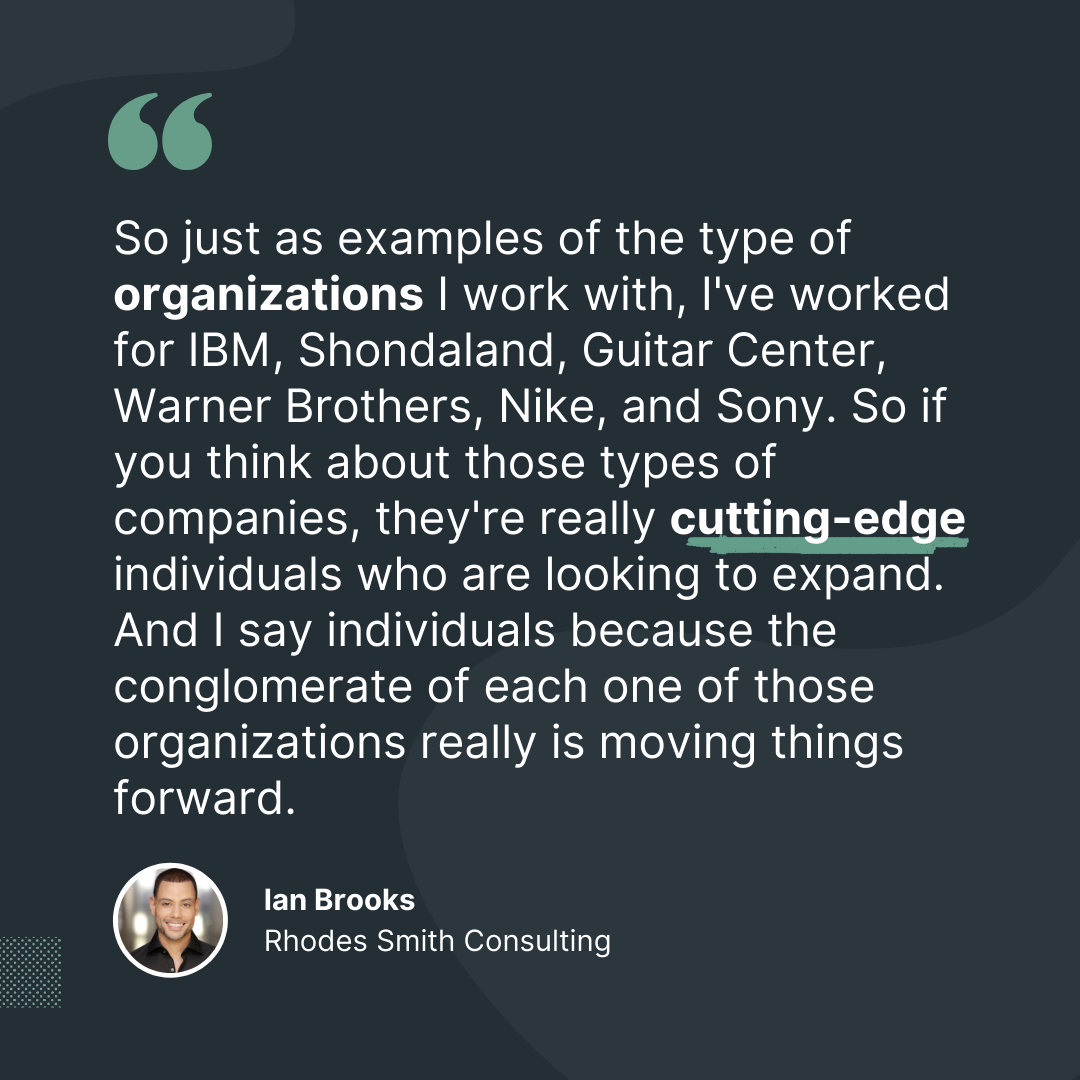
They're constantly doing something. They have a passion for what they do. They have a passion for making sure that they're contributing to one society, but more importantly, they're also driving to expand who they are themselves. That's also true for the individuals of whom I work with. They're not necessarily comfortable with just being in one particular place. They're looking for expansion and that creates some level of vulnerability across the board.
Ian (19:57):
So that's one strength that all of the organizations and individuals of whom I typically work with, start from, but with that said, and to your point, there are some challenges associated with that. Oftentimes the opportunities come around burnout. If you're constantly changing, right? Sometimes people just are tired. We need that level of consistency to test, break, fix on things that we're already doing. Sometimes we sweep things underneath the rug, just to say that our house is going well, that isn't necessarily the case. There’s a quote, I like to, to offer up when I talk about some of the challenges when going and working with organizations or individuals and to quote Niccolo Machiavelli. It comes from his book, The Prince that was actually written, I believe in 1532. The quote, if I hopefully get it right, it goes: "He who does not build his foundations beforehand may be able with great ability to do so afterwards, but with great challenge to the architect and danger to the building." Oftentimes as we're going through transformations and, and that burnout, some of those opportunities I see is that we don't necessarily have good foundations from our organizational side, it's about, “what's my ROI?”.
Ian (21:15):
“What's my return on investment?” So we're trying to create as much efficiency, productivity, visibility, as possible, right? To say that,” yes, we're tying dollars to a particular activity”. So shareholders and employees feel value as important, with employees, with people or rushing to get results, right. Just to say, “yes, we did something”. But oftentimes we don't necessarily have the foundations in place necessarily to move forward. Because of that, when I come into organizations or even when I'm working with people, one of the first things I'm looking for is “what's our foundation?” and “what are we starting with?”. That's one of the opportunities and challenges. That's very consistent across even the best of companies that sometimes are with the best of intentions, we're moving forward and constantly changing. But number one, we're burning ourselves out because we haven't created enough consistency around what we're doing.
Ian (22:02):
And secondly, we don't necessarily have the strong foundations be it, our processes or our technology, or course correcting things that we said we're gonna get to five years ago, but never did. Or people individually who I'm coaching that say, “yes, I'm already doing these things well”, when in fact they're not necessarily doing it well, they've just cut corners and said, “okay, I'm done”. Because I don't wanna go back. So those are the opportunities that I typically see within organizations and people that are fairly consistent.
Ben (22:33):
That foundation I think is critical. And that quote sums it up, because you can go back and try to redo it, but it's gonna be at a detriment. So starting from a good solid base, and I think that can correlate to many aspects, not just in the business world and their personal life as well. Of just having that strong foundation to grow and build, build on top of.
Ian (22:54):
It creates a lot of fear and why people, I think people and organizations don't necessarily go back, it's like, “oh, it would take a lot of effort”. It now creates a whole new level of vulnerability. Again, as the quote mentioned, it's people who can actually do it because you have the skill to do it. You have the capability to do it, but it's a lot more work to you to actually do it right from that architect. And if you wait too long, you're now correcting so many things that it now becomes, as the quote says, a danger to the building and it could come toppling down. So it's best to start off with the right foundation and then we can build around it as we expand.
Ben (23:36):
Yeah. And on that too, it's like not changing for the sake of change, but actually moving towards something and not rushing to that end goal, but taking the time to build the proper processes and get tech in place and all of that good stuff. And then, as we talked about earlier, making that in the core of the culture and everything, that is everybody's gonna be involved. Really, really amazing stuff. We talked about PACE and people following that method, but are there any other quick wins that folks can do to help them be more productive and to get more things done with living with intention?
Ian (24:18):
Yeah. I think there's certain things that we can do to live with intention. I could even qualify living with intention and living with productivity and what do I even mean by that? I will say that intention doesn't necessarily mean, or productivity doesn't necessarily correlate with say some measurable productivity.
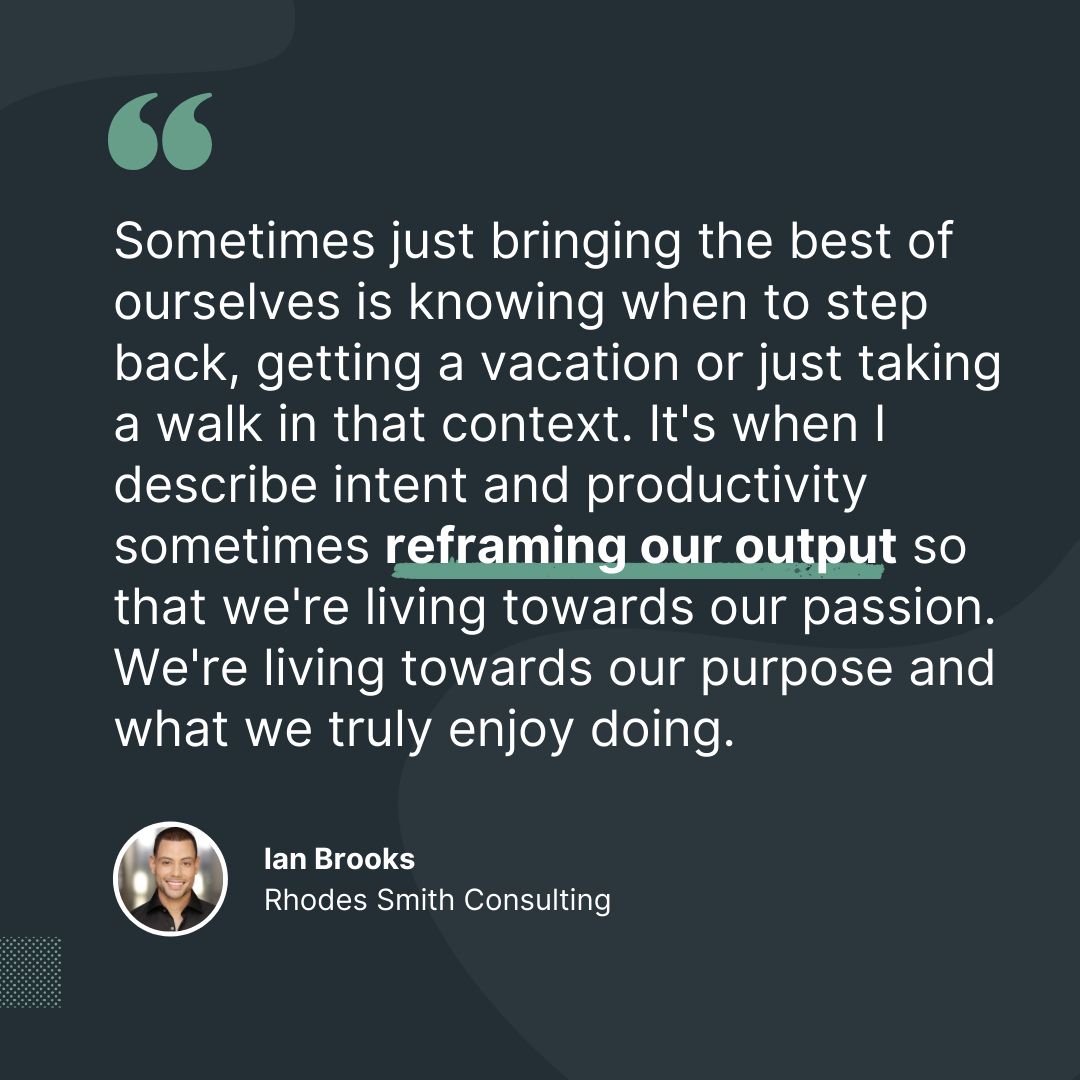
That doesn't necessarily mean we're doing it all the time. So as we start to embark on a process of productivity or thought of productivity, one of the first things I talk early on with my clients about is “what's most important to you?. Let's revisit it and let's realign to your value and what you find enjoyment in”.
Ian (25:33):
And that just isn't one thing, right? It's multiple things. It's who we are and what we give back to society. It's what we now do with our families. It's what we do with our friends. Heck it's even the invest that we put into ourselves. It's identifying what are those true priorities and those values, because now I can then take the next step and say, from a productivity standpoint, “where do I wanna invest my time? Where do I want to put my energy into each day?” And as I mentioned, it doesn't necessarily mean that I'm always doing something. Sometimes I'm just resting because that's what I need right now. Or I'm just thinking, or I'm just reading and that's the best thing I can do for myself. Other times, it's go, go, go, go, go. When we can actually do that early on and identify each day, each moment, on how we're using our time, we then find ourselves being more productive.
Ian (26:34):
It then becomes less about an output or checking a box to say we did. It's oftentimes that enjoyment and love and passion because that's where our energy comes from. That's where our attention comes from. That's where our intention of choice becomes more powerful. And as such, it's one of the things that I say for anyone who's looking for productivity, let's revisit and let's frame what's important to me, what am I passionate about? And let's reprioritize so that I can give my authentic self while also acknowledging what's most important. This resets our mind and allows us to live to our true purpose.
Ben (27:22):
Yeah. That's awesome. Now I personally struggle with just trying to find that because I live a very selfless life. Of, you know, at work, of giving to others and customers and at home with my kids. How does one take stock of that and what are some things that I could do or the audience could do to say, “what is it that we want? What is it that you want? What does that future look like for you?”.
Ian (27:51):
Yeah. It's a strong question and, and point that you make. Similar to yourself, I live a very selfless life. It's one of those things where you're constantly giving. I don't have children, but having a family and, and in a career that's based on giving back to others. I have to force myself and identify time where I'm giving back to myself. And at some times that's gonna feel selfish, right? Because we live a life of constantly giving to others. We now have to be able to step back and give ourselves that time and that space to say, “I just need this time”. And it doesn't have to be a day. It's not like, “Hey, I'm going to Cabo for a week by myself”. Although it could be that depending on your situation.
Ian (28:41):
It's a function of what is that time during the day. And what's that investment that I'm gonna put into myself because that's living to a level of authenticity where I can now give back to others in a more energetic way. In certain instances it’s where I now can be true to that spirit of giving and speaking to my family or speaking to my loved ones or being that father, being that brother, being that husband, being that friend. A a quick win in that would be and, I had to do this for myself, is I take at least a moment every day just for myself. Now that moment could be an hour. It could be whenever space that could be just to reset. Just to say, “how am I investing in myself?” And for me that hour typically comes in a form of working out it's that investment of myself.
Ian (29:43):
It's that downtime. I don't do it with anybody else. Just put the headphones on and just go, because now I'm invested in my health, my body, but also my mind as well. It gives me that downtime. Once I do that, I'm able to then give my full extent of myself to others because now I'm not living in my own regret saying, “darn it. I wish I would've done this”. Or I'm constantly running around chasing kids or dropping them off here or got this activity or accountable to someone else's schedule. I'm now controlling my own in an influx of, yes, those things need to get done, but I'm also giving back to myself as well. So not putting myself last. So when I do have to go drop the kids off or, in my case, partner with my significant other around different activities, taking care of our dogs, taking care of family members, etc. I'm now showing up in a more authentic place.
Ian (30:41):
So in summation, the tactic that I use and that I suggest for those who live a life of constant giving for others is to set aside a moment within each day. Again, be it an hour, be it just 10 minutes of just whatever you can afford yourself that feels right, that you're investing in yourself. Just reading a book, meditating, going out for a hike, a walk, going to the gym in my case, to make sure that I'm investing in my mind, body and soul. So I can show up more authentically in those instances when I'm giving back to others.
Ben (31:20):
Yeah. And carving out that space is giving you permission to do that. I think it ties back to that foundation. Of saying, this is that bit of what you're building on and it has to start with you. If you are not healthy or taking care of yourself, then everything else is gonna be built off that quicksand. That makes total sense.
Ian (31:40):
Absolutely. And you'll find that, or I found for myself and those I work with, when I offer up that idea. I actually put it into my book as well, within the attunement of just to pause, process and reflect. So getting moments in time, within a day or in my book’s case within a week, just to reflect on the week and what you're actually going through, you'll find that other people respect that. They'll start doing the same. They'll respect the space that you've carved out and say, “you know what? This is the time where I just need this time for me.” And it's not that I don't wanna be with you, but I wanna make sure that when I'm with you or when I'm coaching or when I'm with my significant other or family, then I'm present.
Ian (32:27):
That I have the energy. That I have the focus. That I also have invested in myself the same way I'm investing in you. And most people are like, “got it. That makes perfect sense. So let me know when you get back there”. Now that might be a little bit different with kids. You're like, “Hey dad, we hop on you. What are you doing?” But you know, this might be that time. So when you put them in quiet time or whatever the case might be like, “Hey, this is our quiet time. Let's get there in 10 minutes together. Not saying anything, let's see how well we can sit and then let's roll”.
Ben (33:04):
Yep, absolutely. And that's part of the reason why I wake up at four in the morning to a quiet household to just get my mind right. And just prepare for the day for sure.
Ian (33:13):
Yes.
Ben (33:14):
Awesome. So, so what's next for you? What are you excited about? What's coming on the horizon for you?
Ian (33:19):
You know, there's a lot of things that create excitement for me. And I think we touched on a little bit and that's consistently giving back. You know, one of the things that I'm most excited about is I'm starting my next round of group coaching. So I do a number of parts of group coaching called Mastering Your Intentions, where I bring about four to six people together and just walk through a six week process of really establishing a foundation of transformation. That's really exciting because that's an opportunity for me to give back, to have rich dialogue, to really walk people through a journey of their own processes, also taking stock of what others are benefitting from a group dialogue as well. That's really exciting. I'm also excited about the consistency of my individual coaching that I do.
Ian (34:12):
It's really exciting just to talk to people who already have that foundation, but now it's seen them expand, both from a corporate space, but that you might imagine with COVID. And now leading within a varied environment, most likely hybrid for a number of companies, how do their leadership skills show up? So that's a lot of excitement as well, even with parents and adults who are looking to expand from that 18 to 35 year old saying, “Hey, I wanna make sure I'm a CEO in the next five years”. That's a rich dialogue as well. So that's really exciting. Also I'm excited about starting a new chapter and writing another book. So that's in the works, to have that consistency of thought leadership of what I'm contributing back. And so those were the three things that I'm most excited about as I look around and think about my horizon, both in the near term, but also long term.
Ben (35:07):
Awesome. So where can our audience learn a little bit more about you and, and stay up-to-date on everything you're working on?
Ian (35:14):
There's several places that I can be found. So I'll start with probably the most popular one for most, social media. 'm both on Twitter and Instagram, DrB_intention. There they'll see consistency of posts, of which I try to get things out every week. It's one of my growth opportunities as I tend to try to do everything at once, but that's where people can get highlights and updates of some of the things I'm doing. I can be found at my website. That is at Rhodessmith.com. There, they can find this podcast as well as others around other thought leadership and topics of which I'm speaking about. They'll also see links to a copy of my book, Intention, which can be found on Barnes and Noble, as well as Amazon, both in a printed copy or in an ebook. You'll also see and have access to overviews of my coaching, both from a professional standpoint, as well as personal. The personal will take an individual as well as group coaching view. And then there's also the corporate coaching which I do as well. So that is a great place to get any updates relative to myself, as well as access to my book, Intention.
Ben (36:42):
Yeah, sounds great. We'll be sure to put those in the show notes and, and let everybody get connected with you because everything you've shared today has really opened my eyes of just taking the time, building the foundation and not rushing the results. I think that's the biggest thing. So I plan to live with a little bit more intention in my life. I hope everybody else does. So thank you so much, Ian, for, for being on the podcast, it was great to have you. And we hope you enjoy the rest of your week.
Ian (37:08):
No, thank you, Ben. It's been a great pleasure and, likewise, enjoy the rest of your week as well.
Ben (37:12):
All right. Thank you so much. Cheers. Thank you for listening to Get More Done. Be sure to subscribe wherever you get your podcast. If you or someone you know would like to be on the show, you can visit getmoredone.youcanbook.me, reach out to us on Twitter @YouCanBookMe or visit us on the forum forum.youcanbook.me. I'll catch you in the next episode. Cheers.
Subscribe to our newsletter
Get productivity tips, news, articles and resources.Written by
The YouCanBookMe team
We care... so we share. The YCBM team has a lot to say about online scheduling and improving productivity. We pay it forward with interesting articles, top tips, updates, and insights about how to be a scheduling ninja and a productivity pro!
Keep reading
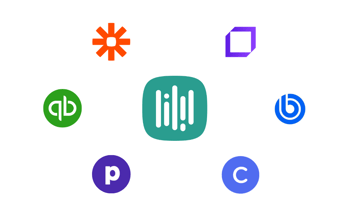
7 Must-Have Coaching Software for Client Success
Streamline your business using these top coaching software, taking the admin tasks off your plate so you can focus on helping your clients become the best version of themselves.
Read bloge1f6.jpg)
Schedule Smarter: 7 Doodle Alternatives to Consider in 2024
On a quest to find the best scheduling tool for your team? Check out the seven best Doodle alternatives, all designed to help you save time and hassle!
Read blog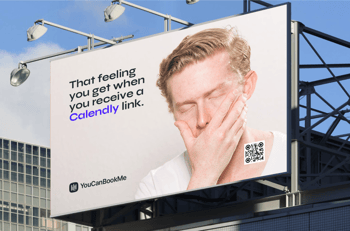
4 Reasons Why YouCanBookMe Is Better Than Calendly
If you're a small business that truly care about your customers, Calendly isn't the right scheduling tool for you. See why YouCanBookMe is better than Calendly on four major fronts.
Read blog


